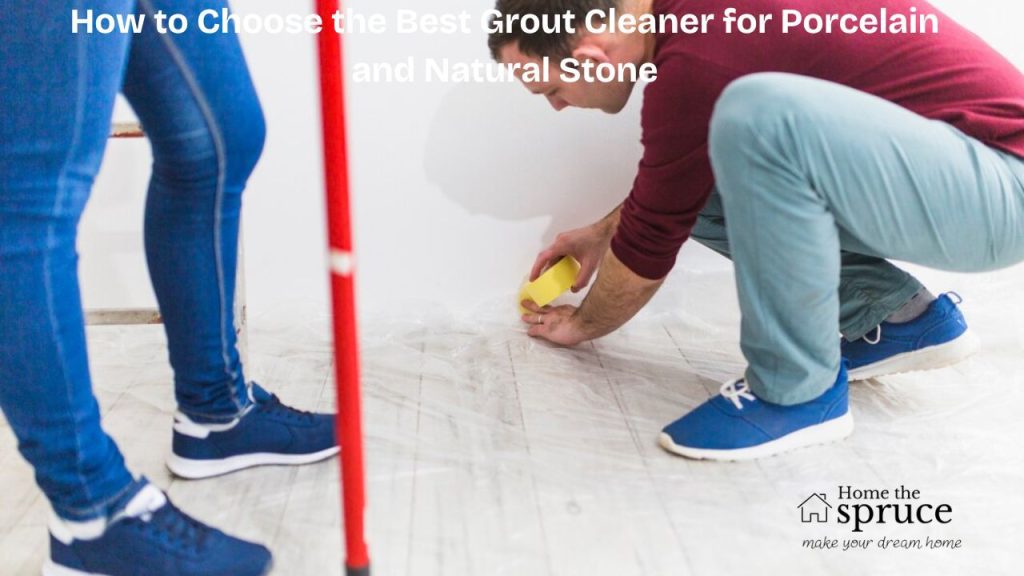When you have installed the desired tiles be it porcelain or natural stones, you will need to maintain the grout lines to make your tile look good. Grout is one of the most important parts of the tiles. They look and feel great when cleaned. However, the dust and dirt may accumulate over time, making cleaning necessary. This is where the best grout cleaner can be greatly helpful. Tiles such as porcelain and natural stone require different cleaning approaches to avoid damage. Whether you are a homeowner or a professional handling commercial spaces here is how you can select the right grout cleaner for porcelain and natural stone.

Key Takeaways
- Porcelain grout needs a pH-neutral, non-residue cleaner for safe and effective maintenance.
- Natural stone grout needs a stone-safe, chemical-free cleaner to prevent damage.
- Light stains work can be cleaned with DIY solutions but professional-grade cleaners provide deeper cleaning and long-term protection.
- Proper application techniques, including pre-cleaning, scrubbing, and rinsing, ensure grout stays clean and intact.
Choosing the Best Grout Cleaner for Porcelain Tiles
Porcelain tiles are durable but the grout lines in them require special care. When selecting the best grout cleaner for porcelain you should consider:
- Be pH-neutral
Harsh acids and alkalines can damage the grout over time. A balanced cleaner maintains its structure.
- Have deep-cleaning properties
A surfactant-based cleaner removes grime without scrubbing.
- Be safe for surrounding surfaces.
Do not use any products that may leave residue as they can affect the finishing of the tile.
A mild pH-neutral cleaner will work great for regular cleaning. If you have to clean the deep stains then an oxygenated bleach cleaner will help break down the dirt without damaging the grout line. For a deeper clean, professionals often use steam cleaning along with grout-safe detergents.
Choosing the right Grout Cleaner for Natural Stone
Natural stones require extra care due to their porous nature. The best grout cleaner for natural stone should:
- Be stone-safe and pH-neutral
Acidic or alkaline cleaners can cause etching or discoloration.
- Avoid harsh chemicals
Bleach, ammonia, and vinegar can damage stone surfaces.
- Contain penetrating cleaning agents
These remove dirt without affecting the stone’s natural seal.
Go for a mild natural stone cleaner compatible with the sensitive surface of stone. For heavy stains, professionals use specially formulated stone cleaners that lift dirt without breaking down the stone’s structure.
DIY vs. Commercial Grout Cleaners
Homeowners usually choose DIY solutions to clean the tiles such as baking soda and hydrogen peroxide. However, they are more suitable for minor stains. If you want to clean thoroughly then commercial grout cleaners are necessary. Commercial-grade cleaners like the one by NT Pavers are perfect for removing stains and they can secure the tile surface as well. Investing in the best grout cleaner prevents damage and extends the life of grout and tile.
Application Techniques for Effective Cleaning
When selecting a suitable gout cleaner, you should know how to apply them for effective cleaning.
Pre-clean the surface
Use a brush or vacuum to remove any loose dirt, leaves, and debris.
Apply the cleaner
Spread the cleaner evenly with a soft sponge or brush.
Let it sit
Let the cleaner break down the stains before scrubbing.
Scrub gently
Use a soft-bristle brush to prevent grout erosion.
Rinse thoroughly
Remove all cleaner residue with clean water.
Steam cleaners can improve efficiency and results for businesses that handle large-scale tile maintenance.
Bottom Line
When you are going to select the best grout cleaner make sure it is suitable for the tile surface. They should gently remove the staining without extra scrubbing and cleaning frequency. Whether you are looking for your home or commercial use, choosing the right product protects surfaces and ensures lasting cleanliness.
















